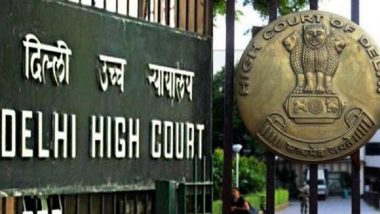New Delhi, October 26: Granting police protection to a couple facing threats from their family post marriage, the Delhi High Court has said the right to marry a person of one's own choice is indelible and constitutionally protected and not even family members can object to such matrimonial ties.
In a recent order, Justice Tushar Rao Gedela emphasised that the State is under a constitutional obligation to provide protection to its citizens and the high court, being a constitutional court, is expected to further the constitutional rights of the couple. Can’t Regulate Political Alliances: Election Commission Tells Delhi High Court on Plea Against Use of Acronym ‘INDIA’ by Opposition Parties.
"The right of the petitioners to marry a person of their own choice is indelible and protected under the Constitution, which cannot be diluted in any manner whatsoever," the court said. "There is no doubt about the factum of marriage between the petitioners and the fact that they are major. No one, not even the family members can object to such relation or to the matrimonial ties between the petitioners," the court asserted while dealing with the couple's petition for police protection.
The petitioners submitted that they they got married in April against the wishes of their parents and were living together happily since then amid threats from the family members, particularly the mother of the woman.
The court directed the "State to provide protection to both the petitioners and ensure that no harm befalls either of them, particularly, from the parents or the family members" of the woman and asked the beat officer concerned to periodically check on them. 'Money Trail Established': Supreme Court Rejects Bail Plea of Manish Sisodia in Delhi Excise Policy Case, Directs To Complete Trial in 6-8 Months.
"In case the petitioners have shifted to a place other than the one shown in the memo of parties, the I.O. shall intimate the said SHO of the concerned police station having territorial jurisdiction over the residential address of the petitioners, who shall comply with the present order in letter and spirit," the court ordered. "The petitioners shall disclose their present residential address as well as working address to the I.O., who shall not disclose the same to any unauthorised person," it said.













 Quickly
Quickly


